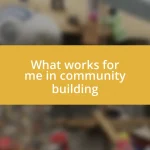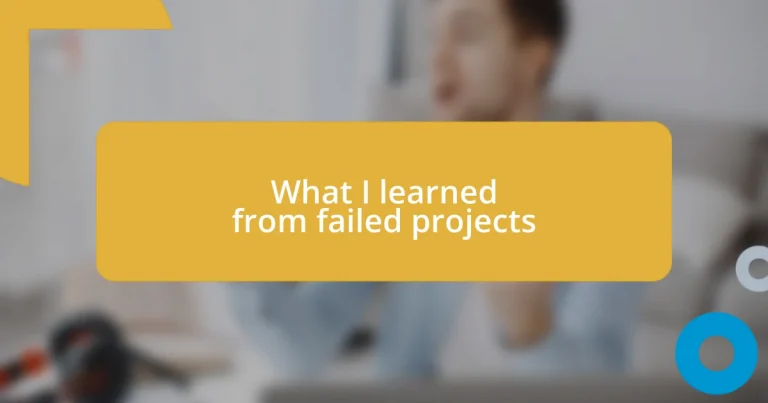Key takeaways:
- Understanding the importance of audience research, team dynamics, and embracing failure as opportunities for growth.
- Recognizing common reasons for project failure, such as poor planning, insufficient stakeholder engagement, and scope creep.
- Adopting a resilience mindset by reframing failures as learning experiences and fostering open communication for collective growth.
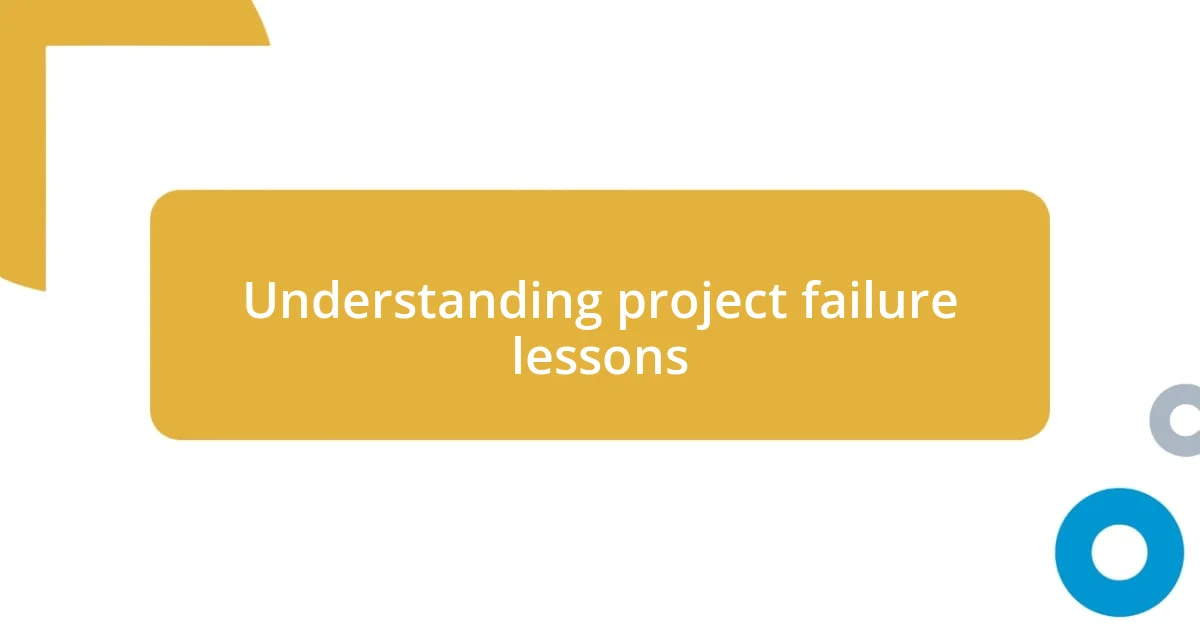
Understanding project failure lessons
Understanding project failure can reveal invaluable lessons that shape our future endeavors. I remember a marketing campaign I spearheaded that flopped spectacularly. It taught me the importance of audience research; I’d assumed I knew what my audience wanted, but I didn’t truly understand their needs and preferences. Have you ever invested time and resources into something, only to realize too late that it missed the mark?
Another striking lesson I learned is the significance of team dynamics. During a software development project, I noticed that communication barriers led to misunderstandings and missed deadlines. It struck me how vital it is to foster an open environment where team members feel comfortable voicing their concerns. When was the last time you checked in with your team on how they felt about the project?
Lastly, embracing failure as a part of the journey is fundamental. I still recall the disappointment of not reaching our objectives, but instead of dwelling on what went wrong, I made it a point to analyze the situation critically. Each setback became a stepping stone, propelling me towards better planning and execution in future projects. Isn’t it remarkable how failure can refine our approach and deepen our resolve?
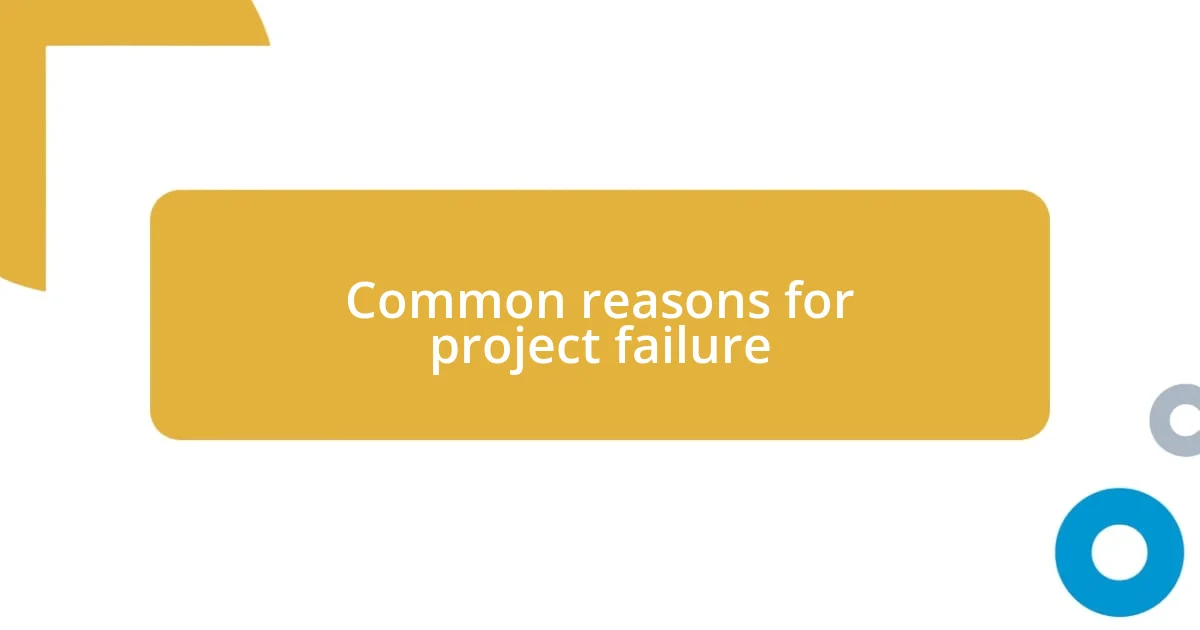
Common reasons for project failure
One common reason for project failure is poor planning. I once jumped into a project without developing a comprehensive schedule, thinking we could figure things out as we went along. It became chaotic quickly, and deadlines slipped away before I even realized it. Have you been in a situation where a lack of foresight led to confusion and stress?
Another factor that often leads to failure is insufficient stakeholder engagement. I learned this lesson when a product launch failed because we didn’t gather enough feedback from key stakeholders. Their insights could have saved us from investing in a direction that didn’t align with their needs. It was a tough pill to swallow, knowing that regular check-ins could have made a substantial difference.
Balancing scope is equally critical; an uncontrolled expansion can derail progress. I vividly recall a project where we kept adding new features without reassessing our resources. This led to burnout among team members and ultimately the project’s collapse. How often have you seen scope creep impact a project, or maybe experienced it firsthand?
| Reason for Failure | Personal Experience |
|---|---|
| Poor Planning | Jumping into a project without a schedule led to chaos and missed deadlines. |
| Insufficient Stakeholder Engagement | Ignoring feedback from stakeholders resulted in a misaligned product launch. |
| Scope Creep | Adding features without reassessing resources caused burnout and project collapse. |
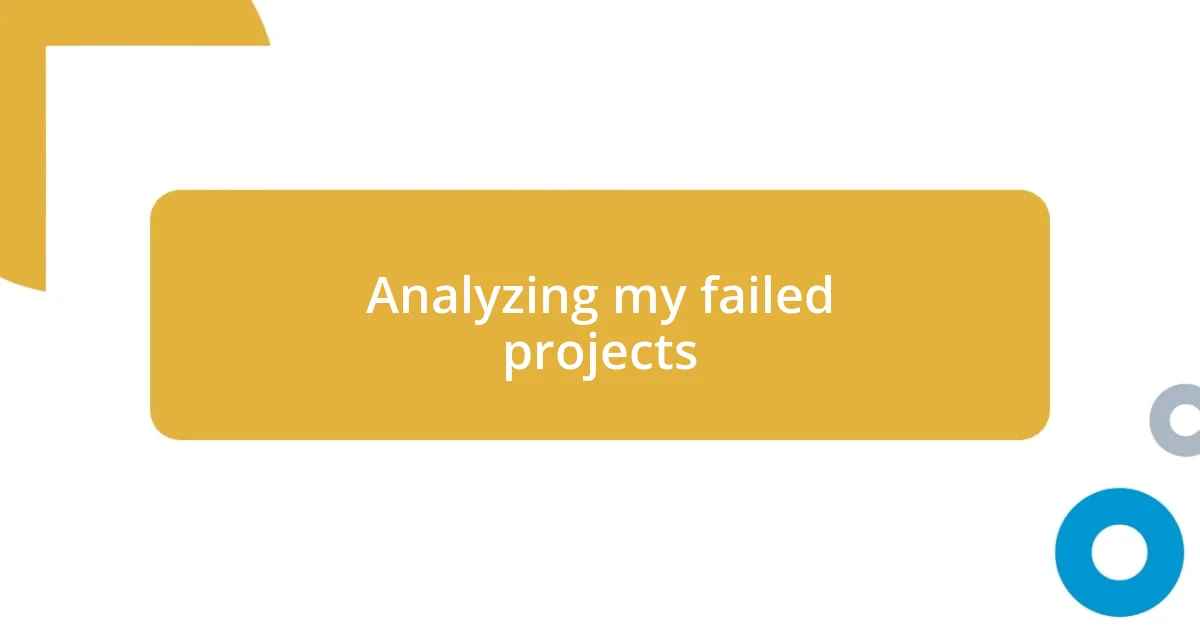
Analyzing my failed projects
It’s enlightening to dive into my past projects and analyze what went wrong. One notable failure was an event I organized that attracted only a handful of attendees. I had been overly confident about the venue and the promotional strategy, neglecting the critical aspect of understanding local interest and timing. The feeling of standing in an empty room was both humbling and a catalyst for change. I realized that tuning into the community’s pulse is paramount before launching any initiative.
Reflecting on my journey, I’ve identified some key takeaways that consistently emerged from my failed projects:
- Insufficient Market Understanding: My belief that assumptions were enough without solid data proved to be a costly mistake.
- Neglecting Timing: Timing can be everything; launching an initiative without considering external events led to dismal participation.
- Ignoring Feedback Loops: I learned the hard way that regular feedback is not just beneficial but essential for course correction.
- Overconfidence in My Skills: Time and again, I underestimated the complexities of projects, leading to oversights that could have been avoided.
- Inadequate Contingency Plans: I often failed to prepare for unforeseen circumstances, which left me scrambling when issues arose.
Taking the time to dissect these experiences has sharpened my approach. Each failed project carries valuable lessons that guide my future decisions, ultimately enhancing my effectiveness and resilience.
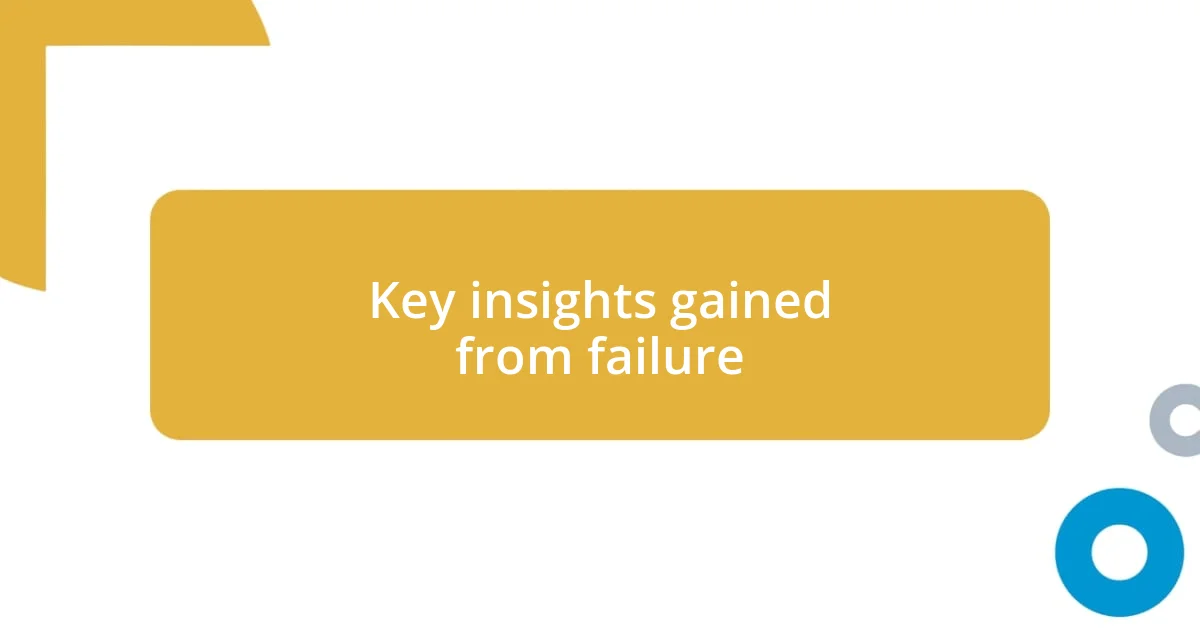
Key insights gained from failure
Experiencing failure often feels like a punch in the gut. I remember when I invested countless hours into a marketing campaign that flopped spectacularly. I thought I had a great message and audience but didn’t take the time to actually understand their pain points. The realization hit hard: if you don’t truly connect with your audience, your efforts can fall flat. Have you ever poured your heart into something only to feel it miss the mark? That gut feeling is a powerful teacher.
Another insight I’ve gained is the importance of flexibility. I once managed a software development project where I was laser-focused on sticking to the original roadmap. When team members proposed alternate solutions that could save time and resources, I hesitated, clinging to our initial vision. The project ended up being delayed, and I couldn’t shake the feeling that I’d wasted precious time. Have you ever found yourself so committed to a plan that you overlooked better options? Learning to adapt can be the difference between failure and success.
Moreover, I’ve learned that embracing vulnerability can lead to growth. In a project that encompassed multiple departments, I hesitated to express my concerns, fearing it would show weakness. Ultimately, my silence created bigger issues down the road. I’ve since realized that sharing doubts can foster collaboration and innovative solutions. How many times have you avoided speaking up, only to regret it later? Vulnerability is not a sign of weakness; it can be a strength that drives the project forward.
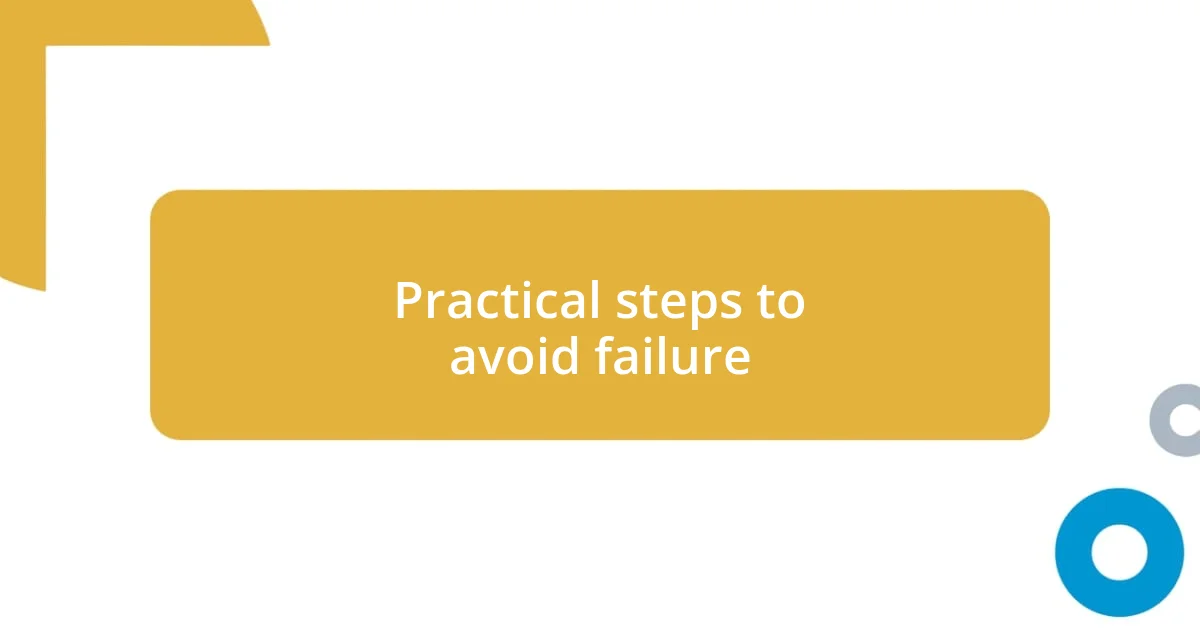
Practical steps to avoid failure
One practical step I emphasize is conducting thorough research before diving into a project. I remember a time when I was eager to launch a creative workshop, confident in my skills yet ignorant of my audience’s needs. Instead of diving headfirst, I should have reached out to potential participants for their input. Have you ever jumped into something without asking for feedback? Taking that extra time to understand your audience can save you from considerable setbacks.
Another vital practice is embracing flexibility throughout the project lifecycle. I once insisted on a strict timeline for an event, believing that structure would ensure success. However, as unexpected challenges arose, it became clear that my rigidity was hindering our ability to adapt. This taught me that remaining open to change not only eases pressure but often leads to better outcomes. Have you ever found that sticking to a plan blindly has backfired on you? Learning to pivot can be a game-changer.
Lastly, establishing a routine for consistent check-ins with the team or stakeholders is crucial. In a collaborative project I led, I neglected regular updates, assuming everyone was aligned. This lack of communication led to misunderstandings that could have been easily avoided. How often do you make the assumption that everyone is on the same page? Committing to check-in meetings or updates can ensure clarity, build rapport, and prevent potential failures down the line.
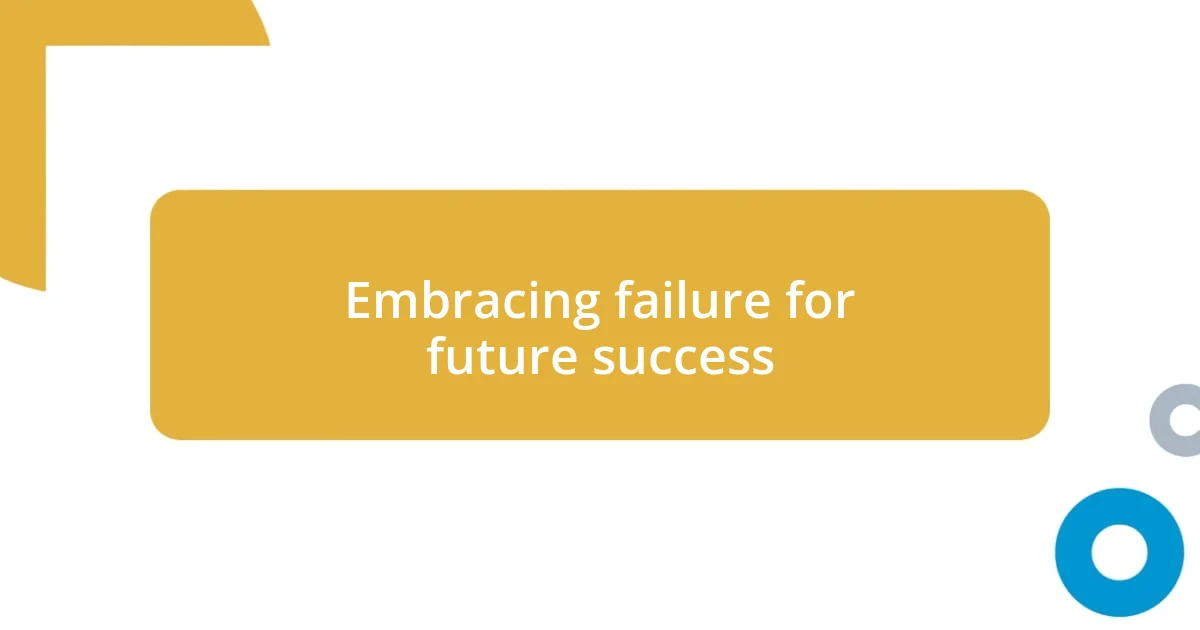
Embracing failure for future success
Embracing failure truly changed my perspective on success. One project I undertook was a fundraising event where I envisioned a grand turnout, only to see a fraction of the attendees I expected. After an initial wave of disappointment, I dove into feedback from those who didn’t show up. The insights revealed that my marketing was too broad and failed to resonate with potential supporters. It’s moments like these that teach us to dig deeper and listen more intently. Have you ever assumed you understood your audience, only to have them surprise you?
One key takeaway from my experiences is that failure can be a crucible for new ideas. When a product I championed went nowhere, I took it as an opportunity to gather my team for a brainstorming session. Surprisingly, the discussions unveiled concepts that evolved into our most successful project to date. This process of turning setbacks into seeds for innovation is invaluable. Do you allow your failures to spawn new ideas, or do you let them weigh you down?
Facing failure also pushed me to build resilience. Early on, I used to feel defeated when a project didn’t go as planned, but I learned to treat each setback as a lesson. After an app I developed didn’t attract users, I found myself at a crossroads. Instead of burying my head in the sand, I sought mentorship, and that led to significant improvements in my subsequent projects. This openness to learning transformed my disappointments into stepping stones. Have you considered how each failure could actually be an invitation to grow?
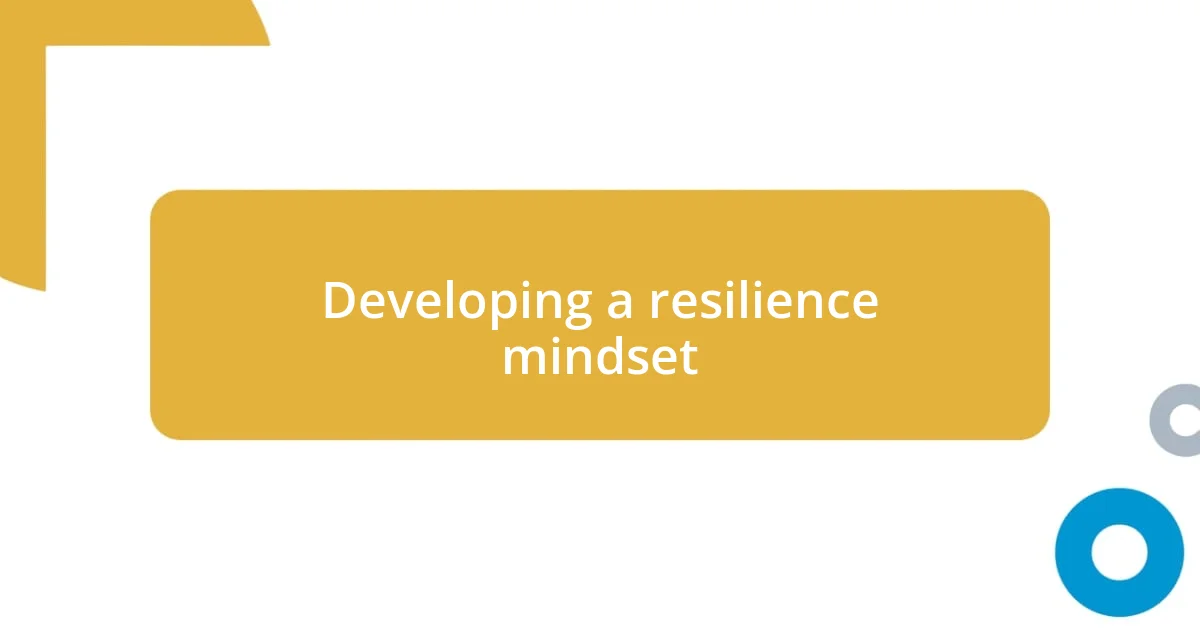
Developing a resilience mindset
Developing a resilience mindset requires a shift in how we perceive setbacks. I recall a time when my passion project hit an insurmountable wall, and my first instinct was to feel disheartened. But rather than wallowing, I asked myself, “What can this teach me?” This question sparked a profound change in my thinking. I realized that every roadblock could guide one to new pathways, transforming frustration into fuel for growth.
It helps to remember that resilience isn’t just about bouncing back—it’s about bouncing forward. I once participated in a team project that flopped dramatically. Initially, I wanted to hide from my teammates, but instead, I chose to orchestrate a reflection session. This decision led to revelations about our missteps and forged stronger bonds among us. Isn’t it interesting how discussing failure openly can foster unity and collective learning? It made me realize that sharing our struggles is often just as valuable as celebrating our triumphs.
Embracing a resilience mindset also means reframing your narrative around failure. I used to think of failures as a dent in my credibility. However, when I started to share my experiences—like the marketing campaign that completely missed the mark—I found that others resonated. They shared their stories too, revealing a collective journey filled with imperfect moments. Have you had similar experiences where vulnerability created connection? This practice of openness not only lessens the weight of failure but also strengthens our resolve to keep moving forward.


